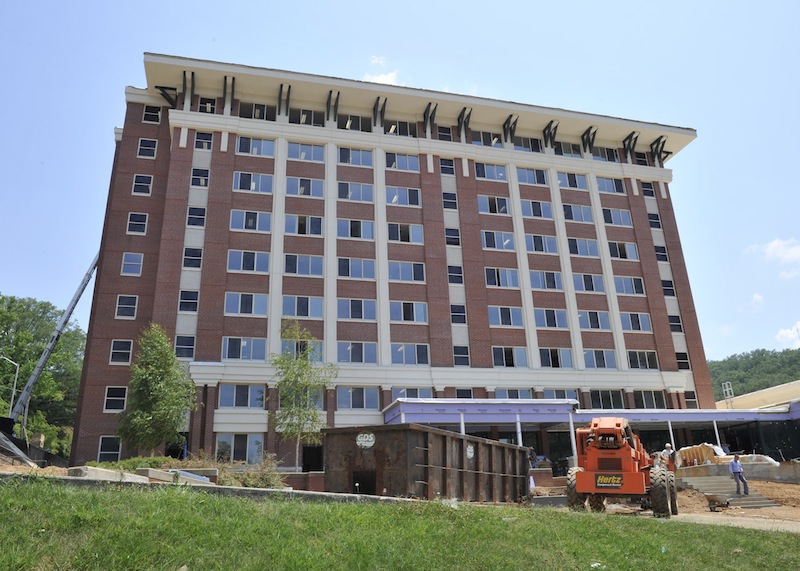
Projects such as the renovation of Harrill Hall to include energy-saving and sustainability features helped Western Carolina University reduce its energy consumption, with the state recognizing the university for its efforts.
From the press release:
The state Energy Office, part of the N.C. Department of Commerce, has recognized Western Carolina University for its achievement in reducing energy costs and promoting utility savings.
Energy Office representative Reid Conway, the Western North Carolina program manager, traveled to the WCU campus to present the university with the Utility Savings Initiative Leadership Award at a June 11 meeting of the WCU Chancellor’s Executive Council, which comprises the institution’s top leadership.
Working from a 2002-03 baseline, all universities in the University of North Carolina system are required to reduce energy consumption by 30 percent by 2015. WCU was the first university in the system to meet this goal, achieving it five of six years since 2005-06. The only other school in the system to hit the mark so far is the University of North Carolina at Wilmington, which did so for 2010-11 and also recently received a leadership award. According to Lauren Bishop, WCU’s energy manager, the university’s conservation efforts have resulted in $13.8 million in energy savings since 2002-03.
All North Carolina public facilities including universities, community colleges, public schools and municipal governments are under a state mandate to reduce their use of energy, water and other utilities. Energy efficiency in public buildings is supported through a program called the Utility Savings Initiative.
The total energy cost for all UNC schools during fiscal year 2010-11 was $226 million, with the University of North Carolina at Chapel Hill and N.C. State University having the highest individual expenses, said Len Hoey, engineering manager and Utility Savings Initiative director for the state’s Energy Office. WCU’s energy expenses for fiscal year 2010-11 were approximately $4.2 million.
“We’re very proud of the accomplishments of Western Carolina, and it makes my job much easier,” said Hoey (pronounced “hoy”), who added that Tom Ross, UNC system president, “believes in the program, believes in the goals, and is working with our office to make sure the universities have the tools to meet the challenge.”
Bishop, energy manager since 2007, said representatives from Appalachian State University, the University of North Carolina at Asheville, East Carolina University, the University of North Carolina at Wilmington, North Carolina Central University, the University of North Carolina at Greensboro and N.C. State University have consulted with her about options for reducing energy use at their schools. Schools in the state system will meet at an Appalachian Energy Summit in July to share ideas and thoughts on energy reduction, Bishop said.
WCU was able to meet its energy savings goals through a variety of efforts, including taking older buildings offline and ensuring new construction employs high building standards and energy efficiency. The university’s energy management specialist, Caden Painter, digitally monitors the heating and cooling in university spaces daily.
Student involvement has helped further reduce energy consumption on campus. This past winter, WCU students bested ASU students in achieving a higher percentage of reduced energy usage during a three-week national energy conservation competition.
“We really launched a lot of new programs this last year, and we’re really involved with student affairs, and we want to continue on that trajectory,” Bishop said.For more information about energy consumption at WCU, contact Bishop at 828-227-3562 or lbishop@wcu.edu.



Before you comment
The comments section is here to provide a platform for civil dialogue on the issues we face together as a local community. Xpress is committed to offering this platform for all voices, but when the tone of the discussion gets nasty or strays off topic, we believe many people choose not to participate. Xpress editors are determined to moderate comments to ensure a constructive interchange is maintained. All comments judged not to be in keeping with the spirit of civil discourse will be removed and repeat violators will be banned. See here for our terms of service. Thank you for being part of this effort to promote respectful discussion.